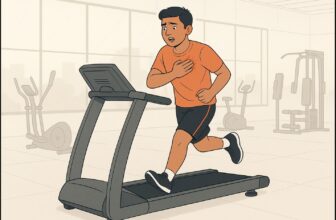Most health problems don’t start overnight. They build slowly while you’re too busy to notice. In India, early-onset diabetes, joint pain in your 30s, poor sleep cycles, and low immunity are now common not because people don’t care, but because good habits start too late.
This list isn’t about big life changes or difficult rules. It’s about small, proven choices you can start now, so your body works better later. Each habit here fits daily life whether you live in a city flat, a rural home, or work full-time from a laptop.
1. Walk Briskly or Move for 30 Minutes Daily Before It Becomes a Struggle
Even in your 30s, sedentary work begins to shrink your muscle strength. Joint stiffness, backaches, and tired legs in the evening become common by 40.
- Walk 3,000-5,000 steps daily
- Climb stairs for 5-10 minutes instead of only using elevators
- Track movement with a free app like Google Fit or StepSetGo
2. Keep Your Wake and Sleep Times Stable Especially on Weekends
Changing your sleep time by 2-3 hours on weekends resets your body’s clock. This pattern is linked to sluggish digestion and mood swings by Monday.
- Fix a wake-up time and allow no more than a 1-hour shift
- Use low-light lamps or warm-tone bulbs after 9 pm
- Avoid phone scrolling 30 minutes before bed
3. Cook Simple Meals With Less Oil at Least 5 Days a Week
India’s average oil consumption is over 20g per person per day double the WHO recommendation. This adds up fast if you’re relying on restaurant food or heavy snacks.
- Use 1 spoon of oil per person per meal
- Replace deep-frying with stir-frying or steaming
- Cook once, eat twice: plan leftovers for lunch or dinner
4. Add Millets or Whole Grains to 2-3 Meals Per Week
Refined grains (like white rice, maida) dominate most Indian plates. Adding ragi, jowar, or bajra increases fiber and helps with sugar balance.
- Replace breakfast poha or upma with millet-based mixes (readily available)
- Try ragi dosa, jowar rotis, or multi-millet khichdi
- Brands like Slurrp Farm or Pristine Organics offer easy options
5. Reduce Sugar, But Do It in Stages
Cutting all sugar overnight often fails. Instead, reduce spoon counts every 2 weeks.
- Drop ½ spoon from your chai or coffee each week
- Choose fresh fruit over packaged desserts
- Use dates, figs, or jaggery in small amounts
6. Leave 12-14 Hours Between Dinner and Breakfast (1-2 Times a Week)
Intermittent fasting improves insulin response and gives your digestive system time to recover. It’s especially useful if you snack late at night.
- Finish dinner by 7:30-8:00 pm once or twice a week
- Have breakfast at 8:30-9:00 am the next day
- Drink water or unsweetened herbal tea during the gap
7. Get One Full Health Test Each Year After 30
ICMR data shows 1 in 3 adults in urban India has prediabetes often without symptoms. Annual tests help catch it before it turns serious.
- Use affordable labs like Thyrocare or Redcliffe
- Prioritise fasting glucose, HbA1c, lipids, thyroid, Vitamin D, and B12
- Mark a fixed month for your checkup (like your birthday month)
8. Include Healthy Fats in All Main Meals
Low-fat diets weaken hormone balance. Fats from ghee, seeds, and nuts help with vitamin absorption and joint health.
- Add 4-5 soaked almonds or 1 tsp flaxseed powder daily
- Use cold-pressed oils (mustard, groundnut, sesame) in rotation
- Cook dals or sabzis with ½ tsp ghee per portion
9. Drink Enough Water, But Don’t Sip All Day
Over-sipping can confuse hunger signals and dilute stomach acids. Dehydration, especially in summer, worsens fatigue and acidity.
- Drink 2.5-3 liters daily in spaced intervals
- Use copper or steel bottles instead of plastic
- Add ORS or lemon-salt water during peak heat months
10. Stretch or Loosen Your Body After Sitting Too Long
Posture-related pain often begins silently in your 30s. Left unchecked, it leads to joint degeneration and stiffness.
- Do shoulder rolls, hamstring stretches, and neck tilts
- Use free apps like Fitify or Cult’s mobility workouts
- Set a reminder every 2 hours if you work at a desk
11. Keep a Monthly Health Snapshot No Apps Needed
You don’t need a fitness band. Pen and paper is enough to track health trends.
What to record once a month:
- Waist size (not just weight)
- Wake-up energy level
- Sleep duration
- Screen hours on weekdays
12. Limit Continuous Screen Use to 45 Minutes
Most Indians now spend over 6 hours a day on screens work plus personal use. This harms vision, posture, and sleep quality.
- Follow the 20-20-20 rule: every 20 minutes, look 20 feet away for 20 seconds
- Use blue-light filters after sunset
- Don’t eat meals while looking at your phone
13. Set Aside One Hour Weekly for a Non-Digital Hobby
Digital fatigue is real and so is attention burnout. Non-digital activities rebuild focus and help you unwind.
- Try balcony gardening, light journaling, walking, or mindful cooking
- Block one hour every Sunday with your phone off
- Start small: even 15 minutes counts
14. Floss Weekly and Visit a Dentist Once a Year
Gum health is directly linked to heart and glucose control. Bleeding gums or bad breath are early signs of deeper problems.
- Use a floss stick or water flosser
- Replace your brush every 3 months
- Choose a clinic offering preventive cleaning not just fillings
15. Choose People Who Keep Your Energy Steady
Emotional stress can damage sleep, appetite, and long-term health. Pay attention to how you feel after spending time with someone.
- Build 1-2 relationships where you can speak without filters
- Reduce exposure to draining people even if they’re family
- Join hobby groups, volunteer circles, or community meetups
Summary – Healthy Habits That Support Long-Term Strength and Stability
No single habit protects your health forever. But when you stack a few together a morning walk, an early dinner, a checkup reminder, a phone break they quietly improve how your body ages.
In India, where many people wait for a warning sign to start caring, these 15 habits are a way to stay ahead. You don’t need to follow all of them at once. Pick 3. Let them become routine. Then add more.





